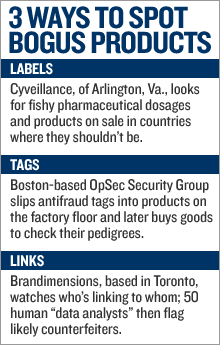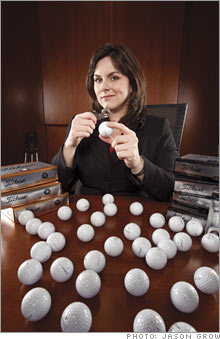Smart technology fights online fakesFaux products are hot -- and so are the Web's counterfeit detectors.(Business 2.0) -- -- This is already shaping up to be a banner year for one Internet industry. Unfortunately, it's the fraud business. Though official numbers are scarce, online protection company MarkMonitor says a record $119 billion in knockoff goods will be sold on the Web in 2007, up from $84 billion last year - everything from counterfeit watches to fraudulent pharmaceuticals. eBay (Charts) has ballooned into a city-size megastore that only an army of security guards could monitor for shady merchants. New online services make it simple and cheap for any site to accept credit card or bank payments, and ads on Google (Charts) can lure bargain-hunting shoppers within hours.
 But just as fake goods are enjoying a heyday online, so are virtual sleuths. New tech firms are arming brand holders with a smart solution: Web-crawling software that detects fraud and sends warnings to apparent violators, often with minimal human action. "There's no other way to do it," says Nils Montan, president of the International AntiCounterfeiting Coalition, which in November created a special committee to combat online piracy. "The Internet is simply too big just to have somebody doing Google searches for counterfeit products. You'd go insane." Instead, companies pay outfits like San Francisco-based MarkMonitor to handle the problem. The privately held company says its revenue grew by 50 percent in 2006 to an estimated $25 million. Its 500 corporate clients pay fees starting at $50,000 a year - a small price to help save millions in fraudulent sales. For example, Acushnet, maker of Titleist golf balls and clubs, was able to shut down 75 auctions of knockoff gear in one day last June using MarkMonitor's software - and it took just one mouse click and "about three minutes from starting enforcement to ending the auctions," says Acushnet trademark manager Lisa Rogan. MarkMonitor isn't alone. About two dozen other companies are using Web-crawling technology to search for counterfeit storefronts and sales. They detect fraudsters who set up shop using domain names similar to legitimate brands or who plaster brands' trademarks and logos on their online storefronts. The companies also monitor counterfeit sales, looking for keywords like "cheap," "discount," "authentic," and "factory variants." They flag colors that the original product wasn't made in and prices that are far too low. Fighting online counterfeiting represents "a big opportunity, and it's just starting to get tapped," says Avivah Litan, a senior analyst at research firm Gartner. Looks like 2007 could be a banner year for the antifraud business too. |
Sponsors
|

